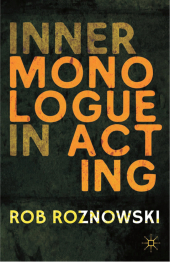 Neuerscheinungen 2013Stand: 2020-01-07 |
Schnellsuche
ISBN/Stichwort/Autor
|
Herderstraße 10
10625 Berlin
Tel.: 030 315 714 16
Fax 030 315 714 14
info@buchspektrum.de |

Rob Roznowski
Inner Monologue in Acting
2013. xi, 223 S. 216 mm
Verlag/Jahr: SPRINGER PALGRAVE MACMILLAN 2013
ISBN: 1-13-735428-3 (1137354283)
Neue ISBN: 978-1-13-735428-0 (9781137354280)
Preis und Lieferzeit: Bitte klicken
What should an actor be thinking onstage? This overlooked, important question is the crux of this new book that combines psychological theory, numerous practical exercises, and a thorough and wide-reaching examination of inner monologue in various forms including film, musical theatre, and comedy.
Introduction: Nick 1. Acting 2. Inner Monologue (IM) in Basic Psychology Mikayla 3. IM Everyday 4. IM in Acting Carolyn 5. IM as Enemy 6. IM versus Subtext Jacqueline 7. IM in Transitions 8. IM Alone Onstage Kirill 9. IM in Objective/Tactic/Obstacle Stephanie 10. IM Out of Your Head 11. IM in Script Scoring Zev 12. IM in Drama 13. IM in Film 14. IM in Classical Theatre Sarah 15. IM in Musical Theatre 16. IM in Comedy Andrew 17. IM in Style Rachel 18. IM in Auditions 19. IM in Other Psychological Situations 20. IM in Other Performance Forms Ian
"This is a great book; it will be useful in the classroom and in production practice. Summing Up: Highly recommended. Readers at all levels." - CHOICE
"Through the examination of self as a person, self as an actor, and self as a character, each chapter aims to ignite the actor´s inner voice and imagination in a manner that fills them up and carbonates them. The detailed examination of the inner monologue that lives in the transitions between lines and the silences between characters is ultimately a life-long lesson for actors of all ages, making this book appropriate for even the most seasoned of actors." - Kevin Connell, Professor of Theatre Arts, Marymount Manhattan College, USA
"I guarantee that actors, acting teachers, and directors will read this book and want to immediately apply the principles and exercises outlined therein. It is certainly an important concept in acting and all too often not explained well in acting texts. I am positive I will retain it as an important teaching tool in all levels of acting and auditioning." - Deborah Jordan, Assistant Professor of Theatre, Program Head, Acting & Directing, Jacksonville University, Florida, USA
Rob Roznowski is Associate Professor and Head of Acting and Directing in the Department of Theatre at Michigan State University, USA.


